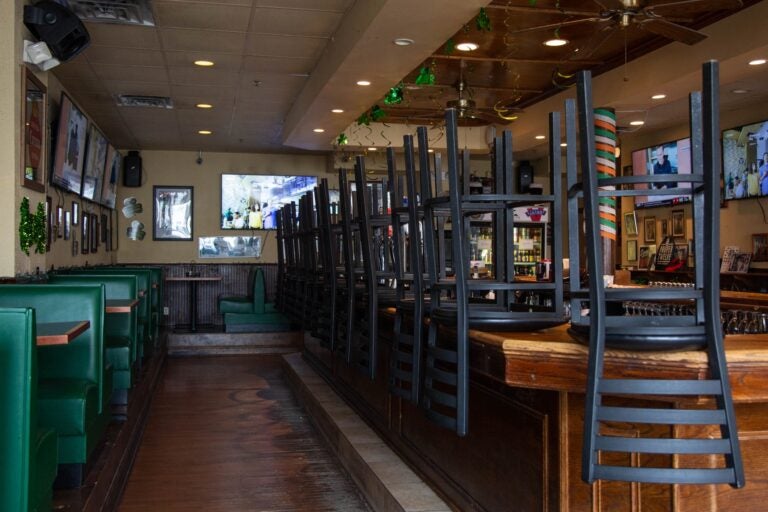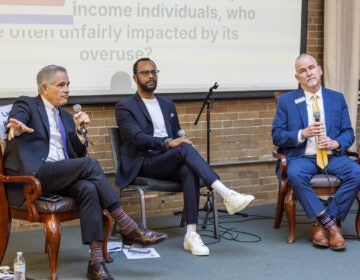$1 billion in relief sat around while Pa. businesses struggled
Pa. lawmakers haggled for six months over how to spend $1 billion in CARES Act money while businesses struggled. In the end, Gov. Wolf sided with Republicans.
Listen 15:49
Restaurants and small businesses in Pennsylvania have been hard hit by the pandemic. (Emily Cohen for WHYY)
Last spring, small business owners in industries like food service and entertainment say they were able to limp through COVID-19 restrictions thanks to help from the CARES Act, which provided relief from the federal government.
Then a second wave of COVID hit and some of those businesses were asked to adhere to restrictions yet again. But this time, no relief was forthcoming — even though some was available.
Pennsylvania had $1 billion dollars of CARES Act money sitting around for six months while the state’s small business owners struggled and lawmakers haggled. Why didn’t the remaining money go to direct aid?
Keystone Crossroads reporters Miles Bryan and Katie Meyer walk us through why things shook out the way they did, and why politicians on both sides of the aisle are pointing the finger at the federal government.

Hear the whole story on The Why
Interview highlights
Philadelphia restaurateur Robert Wasserman on laying off 75 employees with no relief in sight.
There is nothing happening right now. And that’s what’s so scary is the fact that at least in March, you felt like people were supporting you or at least looking after you. Now it’s like the coffers are dry for the city. The state is unwilling to fork over more dollars to help out, and nationally is a hot mess … It’s horrendous. How could it be positive, especially going into the holidays. A lot of these people have families. What demoralizing way to go into the end of the year. It’s sad.
Miles Bryan on businesses that are struggling during COVID’s second surge
Any business that doesn’t have a huge cash reserve that relies on in-person interaction is struggling. The Philadelphia Inquirer put together a list of Philly food and drink spots that are closing, some permanently, and that list is just dozens and dozens of places long … The payroll company Gusto recently crunched some public employment numbers in a bunch of metro areas. I talked to the economist who worked on it, and he said under a baseline scenario, just because people don’t want to dine outdoors because it’s cold, we would see something like the 57,000 jobs lost [in the Philadelphia region].
Katie Meyer on why Republicans didn’t want to use the money for direct relief for businesses
The Republicans were saying, ‘OK, we don’t think we’re going to be able to raise new revenue right now. We don’t want to cut services right now during the pandemic. And so we are going to make sure we can use this money in a way that’s going to help us keep our basic infrastructure going.’ So, things like, health care that the state covers, education, all that kind of thing…Democrats were saying, ‘Well, you have other options. You can do things like legalize recreational marijuana, get tax revenue that way, put a severance tax in the natural gas industry.’
Katie Meyer on why Gov. Wolf sided with Republican lawmakers
Wolf’s calculation here was that he just did not want to create a big impasse right now. The thing we have to remember is that when there’s a big budget hole and there’s no consensus on how to fill it or if the money isn’t there yet, that’s when you usually have big cuts to things like education or human services. It’s happened in the recent past. And it’s always a really messy, wrenching process. And so this puts Wolf in a position where he’s on the record saying he wants to use CARES Act money for direct aid. But if the money goes there, then the budget holes have to be filled some other way … And Republicans didn’t want new taxes. So ultimately, Wolf says his priority was just to fix the difficult financial position the state was in and keep everything funded and then just move on.
 WHYY is one of over 20 news organizations producing Broke in Philly, a collaborative reporting project on solutions to poverty and the city’s push towards economic justice. Follow us at @BrokeInPhilly.
WHYY is one of over 20 news organizations producing Broke in Philly, a collaborative reporting project on solutions to poverty and the city’s push towards economic justice. Follow us at @BrokeInPhilly.
WHYY is your source for fact-based, in-depth journalism and information. As a nonprofit organization, we rely on financial support from readers like you. Please give today.






